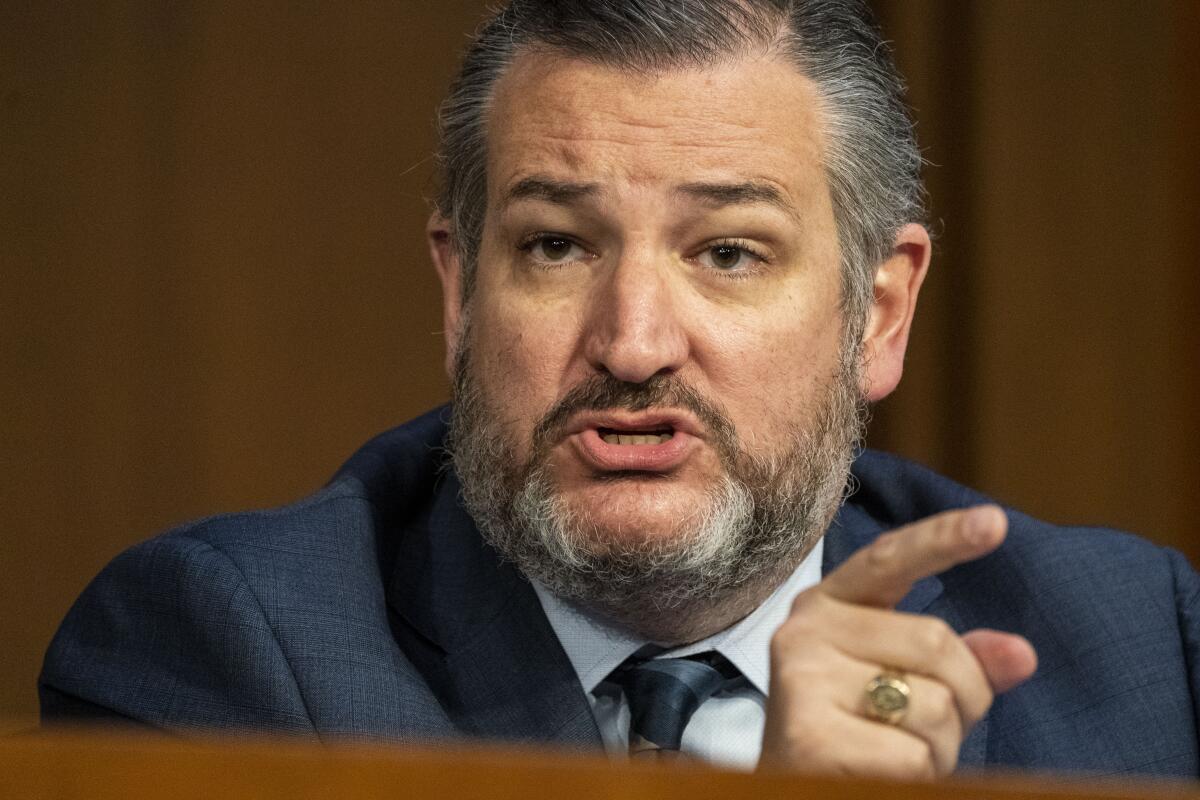Supreme Court rules for Ted Cruz, strikes down limit on post-election gifts to winners

- Share via
WASHINGTON — The Supreme Court on Monday ruled for Sen. Ted Cruz (R-Texas) and struck down the legal limit on how much candidates can collect from big donors after an election is over.
Siding with Cruz, the court’s conservative majority said the anti-corruption limit of $250,000 on post-election gifts to winning candidates violates their right to free speech.
The court has maintained that money in politics is a type of speech, which means that any restriction on how much candidates collect or spend can be challenged under the 1st Amendment.
Candidates are free to spend their own money on their campaigns, including by taking out personal loans. But the McCain-Feingold Act of 2002 said they may not collect more than $250,000 from donors after the election to repay their loans.
Speaking for the court, Chief Justice John G. Roberts Jr. called the limit on loan repayments a “drag on a candidate’s 1st Amendment right to use his own money to facilitate political speech.” Because the limit “burdens core political speech without proper justification,” it is unconstitutional, he said in FEC vs. Cruz.
He was joined by Justices Clarence Thomas, Samuel A. Alito Jr., Neil M. Gorsuch, Brett M. Kavanaugh and Amy Coney Barrett. All six in the majority were Republican appointees.
The three liberal justices, all Democratic appointees, dissented.
“In striking down the law today, the court greenlights all the sordid bargains Congress thought right to stop,” Justice Elena Kagan said in dissent.
“It takes no political genius to see the heightened risk of corruption,” she said, if newly elected lawmakers can turn to big donors to pay off their loans.
Sen. Sheldon Whitehouse (D-R.I.), a frequent critic of the Roberts court, described the ruling as “another victory for right-wing donors in their assault on our campaign finance system.”
Supporters of campaign finance laws said the limit on post-election gifts to winning candidates had little impact on free speech.
Before an election, contributions to the candidate can be seen as funding speech because they pay to fund campaign ads that seek to sway voters. However, that is not so after the election has been decided.
“Post-election contributions to repay candidate loans poses a special danger of real and apparent quid pro quo corruption,” Justice Department lawyers told the court. “Every dollar given by the contributor ultimately goes into the candidate’s pocket.”
Cruz set out to challenge the law in 2018. Just before he won reelection, he took out a $260,000 personal loan for his campaign, knowing that he could not repay the last $10,000 of the loan with contributions from donors.
He acknowledged that his “sole and exclusive motivation” in taking out the loan was to give himself the legal basis to challenge the limit as unconstitutional. He argued the limit could prevent a cash-strapped candidate from taking out big loans to finance his campaign. Moreover, individual donors are limited to giving $2,900 at a time.
He won in a lower court and the Federal Election Commission appealed.
Senate Republican Leader Mitch McConnell of Kentucky and the Republican National Committee filed friend-of-the-court briefs in support of Cruz.
McConnell’s brief was written by President Trump’s White House counsel, Donald McGahn, and his solicitor general, Noel Francisco. They urged the court to not only strike down the limit on post-election gifts, but to strike down what remains of the McCain-Feingold Act.
Shortly after it was passed and signed by President George W. Bush, McConnell sued to have it struck down. He lost in the Supreme Court by a 5-4 vote in the case of McConnell vs. FEC.
In 2006, after Alito replaced Justice Sandra Day O’Connor, the majority flipped, and the court has struck down most of its provisions, including in the 2010 Citizens United case.
For more than a decade, Roberts and Kagan have regularly clashed over the constitutionality of campaign funding laws, and they did so again in Monday’s decision.
Under Roberts, the court has freed incorporated groups known as Super PACs to spend unlimited sums on congressional campaigns, and it has voided federal and state laws that limited the advantage for wealthy and big spending candidates.
In Monday’s opinion, Roberts repeated his view that Congress may not seek to prevent big donors from using their money to buy “influence or access” with lawmakers. Rather, he described this use of money as democracy at work.
“Our cases make clear that ‘the government may not seek to limit the appearance of mere influence or access’,” the chief justices said. “As we have explained, influence and access embody a central feature of democracy — that constituents support candidates who share their beliefs and interests, and candidates who are elected can be expected to be responsive to those concerns.”
Kagan said most Americans think that donors seek to buy favors and it appears corrupt when a donor is “adding to a candidate’s personal wealth” by paying off his loans.
“The public knows that to be true. The public’s representatives in Congress knew it to be true. Only this court — somehow — does not,” she wrote. “Democracy works only if the people have faith in those who govern,” she said quoting an earlier dissent. “The people cannot have faith in representatives who trade official acts for financial gain.”
More to Read
Get the L.A. Times Politics newsletter
Deeply reported insights into legislation, politics and policy from Sacramento, Washington and beyond. In your inbox three times per week.
You may occasionally receive promotional content from the Los Angeles Times.











